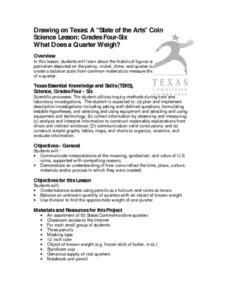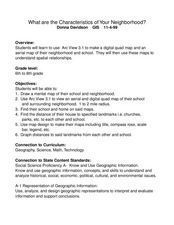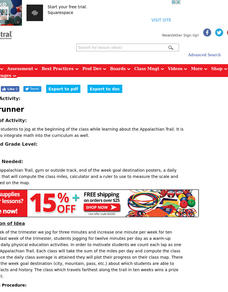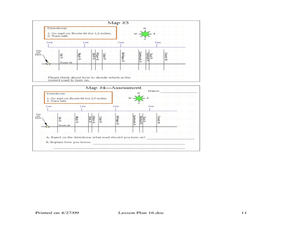Curated OER
America the Beautiful
Learners listen to a read-aloud discussing the landmarks of the United States. In pairs, they use the internet to research a landmark of their choice. They create a visual aid to be given with a presentation sharing the information...
Curated OER
Stream Gages and GIS
students interpret recent regional-scale climate events based on current stream flow, monitor changes in time, and to consider additional interpretations that could be derived if other data were in map form.
Curated OER
What Does a Quarter Weigh?
Students study the historical figures and symbols of U.S.
patriotism depicted on the penny, nickel, dime, and quarter coins. They
create a balance scale from common materials to measure the approximate weight
of a quarter.
Curated OER
What Are The Characteristics of Your Neighborhood?
Students make a mental map of their neighborhood. Using a software program, they make an aerial and digital map of their school and locate their school on given maps. In groups, they calculate the distances to various locations and...
Curated OER
Snow Cover By Latitude
Learners examine computerized data maps in order to create graphs of the amount of snowfall found at certain latitudes by date. Then they compare the graphs and the data they represent. Students present an analysis of the graphs.
Curated OER
Exploring Infrared Image Technology
Students view infrared images of a blowing hair dryer, a Popsicle, and a toaster. They discuss the images and ways they are different than visible light images. Students view a temperature scale and discuss which parts of the item are...
Curated OER
Social Studies For Elementary School
Fourth graders become familar with maps and work in groups to get an overview of what Europe is like. The real assignment is in the form of students creating their own trip if it could really be taken.
Curated OER
Geography: Islands and Alcatraz
Students, in groups, create maps of islands including map keys and compass roses. They compare and contrast their island communities with that of the island prison, Alcatraz. Students select from a series of projects, including writing...
Curated OER
Exploring History Through Photographs
Fifth graders compare and contrast photographs from the 1800s to those of 2003. In groups, they create drawings of how society has changed over time and use maps to locate local streets. Individually, they practice measuring the...
Curated OER
Architectural Buildings
Fifth graders explore various styles of architecture. They work together to create a town with clay buildings that come together in order to form this small town. They discuss maps, layouts, and the structure of buildings.
Curated OER
Sea Surface Temperature Trends of the Gulf Stream
Students explore the importance of the Gulf Stream. Using a NASA satellite images, they examine the sea surface temperature. Students collect the temperature at various locations and times. Using spreadsheet technology, they graph the...
Curated OER
Sea Surface Temperature Trends of the Gulf Stream
Young scholars use authentic satellite data to produce plots and graphs of sea surface temperature as they explore the seasonal changes of the Gulf Stream.
Curated OER
Site vs. Situation: Location! Location! Location!
Students examine places with a similar latitude to Alabama, and discuss the importance of a location's site versus its situation. They analyze maps, create a chart, and write a paragraph on the difference between site and situation.
Curated OER
A Capital Idea
Students write a description of the spatial organization of the former and present location of New Hampshire's state capital. They analyze maps, participate in a class discussion, and calculate the distance of Concord from the borders...
Curated OER
Peru's Earthquake
Students identify the patterns of earthquakes by mapping USGS data and comparing it to mapped tectonic plates. They discover the relationship between earthquakes and the moving plates of the Earth's crust.
Curated OER
Ecosystems
Students work together to identify the characteristics of their local ecosystem and another one nearby. In groups, they use a Venn Diagram to compare and contrast the two. They use this information to create a collage of both...
Curated OER
Let's Go to Nagano!
Students, individually and in groups, utilize Internet sites to access maps, scales, and information to assist them in calculating distances. They research modes of travel from their homes to Nagano, Japan, and write a travel agenda for
Curated OER
Ridgerunner
Students jog for three minutes at the beginning of the class, increasing one minute per week for ten weeks. They count each lap as one mile on the Appalachian Trail, computing the class average and plotting their progress on a class map.
Curated OER
Researching the World's Oceans
Students research and compare important features of the oceans based on current data. They examine the globe or map, determine the major oceans of the world, and record their names on the data sheet.
Curated OER
Earthquakes and Seismic Waves
Students investigate the Richter scale and seismology in a teacher-led lab in which they are introduced to the concept of seismic waves and epicenter location. They further investigate the inner workings of a seismograph and practice...
Curated OER
Patchwork of the Planet
Young scholars are taught how satellite images can be joined to make a picture mosaic. They use actual satellite images to make satellite mosaics regions of the United States. Students use a camera to photograph portions of a globe in...
Curated OER
The Slave Trade
Students map and explore a possible slave trade route. In this slave trade mapping lesson, students calculate the distance and amount of time it would take for African slaves to arrive in America.
Curated OER
Where Should You Turn?
Fourth graders complete activities to study decimal numbers. In this decimal numbers instructional activity, 4th graders study decimal numbers to express numbers less than one and intervals. Students complete map and location activities...
Curated OER
Activities to Enhance STEDII Data
Students develop an understanding of related weather processes such as wind, cloud cover, and temperature using STEDII data and instrumentation. In addition, they integrate mathematical calculations to produce a forecast map.
Other popular searches
- Using a Map Scale
- Using Map Scales
- Using Map Scale Distance
- Using Maps to Scale
- Proportions Using Map Scale
- Maps Using Scale

























